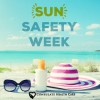Sun Safety Awareness Week happens every June, according to the Sun Safety Alliance. This important month is a great time for seniors to brush up on their knowledge about preventing skin cancer and keeping healthy in the sun. Here is some information to help you celebrate the coming summer while staying safe:
Older skin is more susceptible to sun cancer
The National Institutes of Health stated that skin cancer is the most common type of cancer in America. Over a million people each year are diagnosed with the disease in one of its three forms, melanoma, basal cell carcinoma or squamous cell carcinoma. Some skin cancer is serious and requires immediate removal of the cancerous cells. The Skin Cancer Foundation noted that your chances of developing skin cancer go up the older you are. This is true because the longer you have been alive, the more exposure your skin has had to the sun. It’s also important to know that anyone can get skin cancer, no matter their race, ethnicity or skin tone.
Easy changes can help you prevent skin cancer
You don’t have to radically alter your lifestyle to reduce your likelihood of developing skin cancer. In fact, a few simple changes can help your skin stay healthy. Applying sunscreen before going outside is the first step. If it is hot and you are sweating or otherwise getting wet, like while swimming, reapply sunscreen every few hours. Look for waterproof formulas to make the most of each application. Avoid going out at the sunniest points of the day, or be sure to take shade breaks where you get out of the hot sun and cool off. It can be fun to be out when the weather is hot and sunny, but it’s also dangerous if you don’t drink water and take breaks.

See your doctor with concerns
When walking through a senior living community, you’ll likely notice a few people who have skin abnormalities. Whether they occur in the form of a mole or discoloration, it’s not uncommon for seniors’ skin to look different than that of a younger person. That doesn’t mean, however, that a skin abnormality should be ignored. In fact, if you notice something unusual on your epidermis, talk with your doctor right away. He or she may take a biopsy of the affected area to test and establish if you have skin cancer. In the event that you do have the disease, removing the spot may be all it takes to address the issue. The Mayo Clinic said that freezing the cancerous skin, scraping it away or lasering the area may be appropriate forms of treatment. Individuals with skin cancer that cannot be fully removed may go through chemotherapy, radiation treatment or biological therapy to ensure all the cancer-causing cells die off.
If you found an error, highlight it and press Shift + Enter or click here to inform us.



